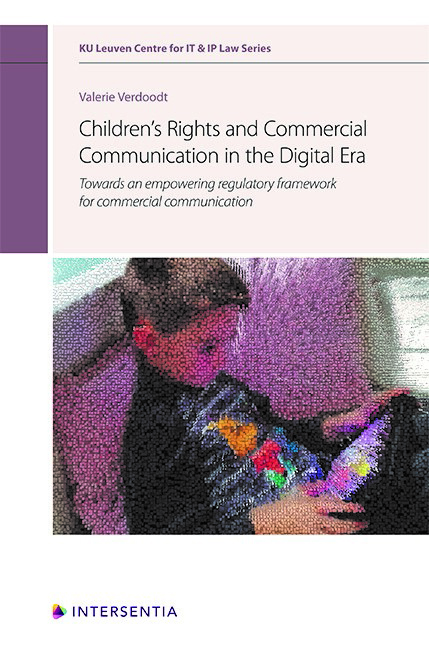 Children's Rights and Commercial Communication in the Digital Era
Children's Rights and Commercial Communication in the Digital Era Book contents
- Frontmatter
- Preface
- Contents
- Abbreviations
- Introduction
- PART I CHILDREN'S RIGHTS AND ADVERTISING LITERACY IN THE DIGITAL ERA
- PART II ASSESSMENT OF THE REGULATORY FRAMEWORK FOR COMMERCIAL COMMUNICATION IN LIGHT OF CHILDREN'S RIGHTS
- PART III ASSESSMENT OF NATIONAL ARIS IN THE AREA OF COMMERCIAL COMMUNICATION
- CONCLUDING REMARKS AND RECOMMENDATIONS FOR THE FUTURE
- Bibliography
- Miscellaneous Endmatter
Conclusion An Analytical Framework for the Regulatory Framework for Commercial Communication
Published online by Cambridge University Press: 23 July 2020
- Frontmatter
- Preface
- Contents
- Abbreviations
- Introduction
- PART I CHILDREN'S RIGHTS AND ADVERTISING LITERACY IN THE DIGITAL ERA
- PART II ASSESSMENT OF THE REGULATORY FRAMEWORK FOR COMMERCIAL COMMUNICATION IN LIGHT OF CHILDREN'S RIGHTS
- PART III ASSESSMENT OF NATIONAL ARIS IN THE AREA OF COMMERCIAL COMMUNICATION
- CONCLUDING REMARKS AND RECOMMENDATIONS FOR THE FUTURE
- Bibliography
- Miscellaneous Endmatter
Summary
CHILDREN'S RIGHTS AND NEW FORMS OF COMMERCIAL COMMUNICATION. The first section of this chapter introduced the children's rights framework and explored children's rights in the digital era. From this analysis, it can be concluded that both the digitisation and the commercialisation of children's worlds impacts not only how children can exercise their rights but also how these rights may be protected, promoted or neglected. In order to address this reconfiguration of children's rights and adapt to the new reality – children as early adopters of new technologies accessing commercialised digital environments for play, communication and information from a very young age – a specific interpretation of the relevant provisions of the UNCRC framework was needed.
CHILDREN'S RIGHTS AS AN ANALYTICAL FRAMEWORK FOR REGULATION. Therefore, the second section of the chapter focused on the interpretation of the rights and principles in the specific context of commercial communication. Regarding the role of children's rights in regulating advertising, it was argued that the interpretation of the rights and principles should function as a comprehensive analytical framework in light of which the legislative or self- and co-regulatory framework for commercial communication aimed at children should be evaluated. From this interpretative exercise, a number of important outcomes can be highlighted.
A MULTI-DIMENSIONAL APPROACH: balancing empowerment and protection. The overarching conclusion of the above analysis is that the tension between the objectives of protection, participation and provision of the child is clearly present in the digital environment. On the one hand, misleading or harmful advertisements online and the collection of children’s personal data for advertising purposes raises significant issues in relation to inter alia children's rights to development, privacy and protection against economic exploitation. On the other hand, children's right to development and self-determination requires that children are educated and empowered to cope with commercial communication, in accordance with the child's evolving capacities as a ‘consumer’. Furthermore, the digital environment offers great opportunities for children's rights to participation, education, and play, and the advertising industry has an important role in the creation and maintenance of good-quality content and online services for children.
- Type
- Chapter
- Information
- Children's Rights and Commercial Communication in the Digital EraTowards an Empowering Regulatory Framework for Commercial Communication, pp. 101 - 104Publisher: IntersentiaPrint publication year: 2020


